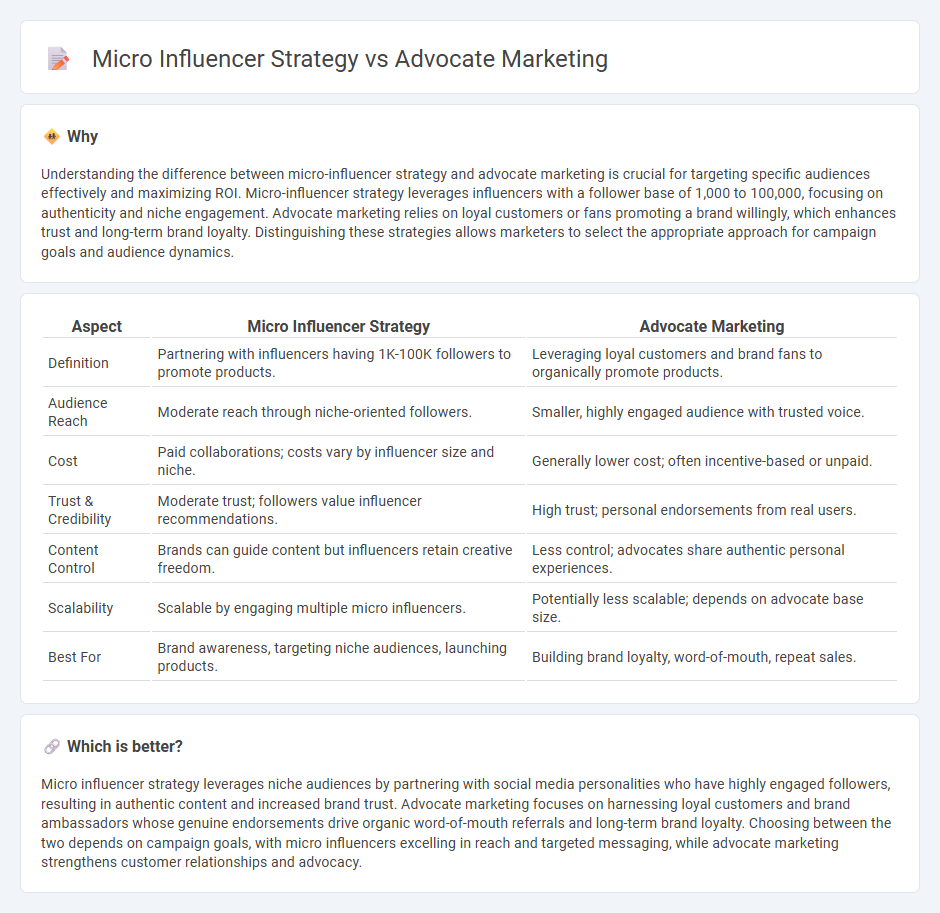
Micro influencer strategy leverages individuals with modest but highly engaged audiences to promote products authentically, often resulting in higher trust and conversion rates than traditional advertising. Advocate marketing focuses on turning satisfied customers into brand ambassadors who actively share positive experiences, enhancing credibility and organic reach. Explore the nuances and benefits of both approaches to optimize your marketing campaigns effectively.
Why it is important
Understanding the difference between micro-influencer strategy and advocate marketing is crucial for targeting specific audiences effectively and maximizing ROI. Micro-influencer strategy leverages influencers with a follower base of 1,000 to 100,000, focusing on authenticity and niche engagement. Advocate marketing relies on loyal customers or fans promoting a brand willingly, which enhances trust and long-term brand loyalty. Distinguishing these strategies allows marketers to select the appropriate approach for campaign goals and audience dynamics.
Comparison Table
| Aspect | Micro Influencer Strategy | Advocate Marketing |
|---|---|---|
| Definition | Partnering with influencers having 1K-100K followers to promote products. | Leveraging loyal customers and brand fans to organically promote products. |
| Audience Reach | Moderate reach through niche-oriented followers. | Smaller, highly engaged audience with trusted voice. |
| Cost | Paid collaborations; costs vary by influencer size and niche. | Generally lower cost; often incentive-based or unpaid. |
| Trust & Credibility | Moderate trust; followers value influencer recommendations. | High trust; personal endorsements from real users. |
| Content Control | Brands can guide content but influencers retain creative freedom. | Less control; advocates share authentic personal experiences. |
| Scalability | Scalable by engaging multiple micro influencers. | Potentially less scalable; depends on advocate base size. |
| Best For | Brand awareness, targeting niche audiences, launching products. | Building brand loyalty, word-of-mouth, repeat sales. |
Which is better?
Micro influencer strategy leverages niche audiences by partnering with social media personalities who have highly engaged followers, resulting in authentic content and increased brand trust. Advocate marketing focuses on harnessing loyal customers and brand ambassadors whose genuine endorsements drive organic word-of-mouth referrals and long-term brand loyalty. Choosing between the two depends on campaign goals, with micro influencers excelling in reach and targeted messaging, while advocate marketing strengthens customer relationships and advocacy.
Connection
Micro influencer strategy and advocate marketing are connected through their reliance on authentic, trust-driven relationships to promote brands effectively. Both approaches leverage individuals with strong, niche followings who genuinely support the product, resulting in higher engagement and conversion rates. Integrating micro influencers as brand advocates amplifies word-of-mouth marketing, enhancing credibility and expanding organic reach.
Key Terms
Advocate Marketing:
Advocate marketing leverages loyal customers and brand enthusiasts who voluntarily promote products, often generating higher trust and authentic engagement compared to micro influencers who may be paid for endorsements. Advocates typically have deeper emotional connections to the brand, leading to more credible word-of-mouth referrals and increased customer retention rates. Discover how advocate marketing can transform your brand loyalty and customer outreach strategies.
Brand Ambassadors
Advocate marketing leverages passionate Brand Ambassadors who authentically promote a brand through personal trust and long-term relationships, enhancing credibility and customer loyalty. In contrast, micro-influencer strategies utilize individuals with smaller but highly engaged followings to target niche audiences, often focusing on short-term campaigns and product promotions. Discover how choosing between Brand Ambassadors and micro-influencers can optimize your marketing ROI and brand impact.
Word-of-Mouth
Advocate marketing leverages loyal customers to generate authentic word-of-mouth referrals, resulting in high trust and long-term brand advocacy. Micro influencer strategy targets niche audiences with individuals who have smaller but highly engaged followers, offering tailored and credible endorsements. Explore the nuances between these approaches to maximize your word-of-mouth marketing impact.
Source and External Links
What is Advocate Marketing: What it is and Why Does ... - Advocate marketing leverages customers' positive endorsements to convert new customers within their network by amplifying testimonials and user-generated content, driving product adoption, customer lifetime value, and revenue growth.
What Is Advocacy Marketing? Strategies and Examples - Advocacy marketing converts loyal customers into brand advocates who promote products authentically through reviews, recommendations, and referrals, often unpaid, strengthening trust and driving sales.
What Is an Advocate Marketing Program? (+ Examples) - An advocate marketing program turns existing customers into brand advocates who champion your brand and encourage purchases, emphasizing a customer-first approach and shareable content to fuel growth.
 dowidth.com
dowidth.com